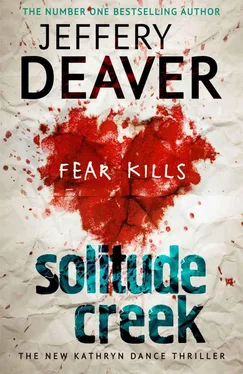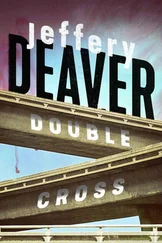She followed the path away from the parking lot, through a head-high tangle of brush and grass. Here, overgrown with vegetation and dusted with sand, were the remnants of old structures: concrete foundations, portions of rusting chain-link fences and a few columns. They had to be seventy-five years old, a hundred. Quite extensive. Maybe back then Solitude Creek was deeper and this was part of the seafood industry. The site was fifteen miles north of Cannery Row but back then fishing was big business all along this area of the coast.
Or possibly developers had started to build a project here — apartments or a hotel or restaurant. Still would be a good spot for an inn, she reflected: near the ocean, situated amid rolling, grassy hills. The creek itself was calming and the grayish water didn’t necessarily mean bad fishing.
Continuing past the ruins, Dance looked around. She wondered if the killer had parked his car here — there were residences and surfaced roads nearby — and walked this same path. He could have gotten to the parking lot without being seen, then circled around to the jobbing company to get to the drop-box and trucks.
When she got to the pocket of homes — a half-dozen bungalows, one trailer — she realized that someone would be very visible parking there: basically the only place would be directly in front of a house. She doubted that the perp would have been that careless.
Still, you did what you could.
Three of the homes were dark and Dance left a card in the doorframes of each.
Two women, however, were home. Both white, large and toting infants, they reported they hadn’t seen anyone and, as Dance had surmised, ‘Anybody parking here, well, we would’ve noticed, and at night, Ernie would’ve been out to talk to him in a hare-lick.’
Dance moved on to the last place, the trailer, which was the only residence actually overlooking Solitude Creek.
Hmm. Had he used a boat to cruise up to the roadhouse and jobbing company?
She knocked on the door frame. A curtain shifted and Dance held up her ID for the woman to peruse. Three locks or deadbolts got snapped. A chain too. The person lives alone, Dance thought. Or she’s a meth cooker.
Dance’s hand dipped to where her gun used to be. She grimaced and tugged her jacket closed.
The woman who opened the door was slimmer than the others, about forty-five, long gray-brown hair. A thin braid, purple, ended in a feather at her shoulder. From what she wore and what was scattered around the cluttered living area, Dance saw that the woman’s fashion choices favored macramé, tie-dye and fringe. She immediately thought of her associate TJ Scanlon, at the CBI, whose one regret in life was that he wasn’t living in the late sixties.
‘Help you?’
Dance identified herself and flashed her ID once more for a closer examination The woman, Annette, didn’t seem uneasy to be talking to a law enforcer. Dance detected only cigarette smoke and its residue, bitter and stale. Nothing illegal.
‘Have you heard about the incident at Solitude Creek roadhouse?’
‘Terrible. Are you here about that?’
‘Just a couple of questions, you don’t mind.’
‘Not at all. You want to come in?’
‘Thanks.’ Dance joined her. Thousands of CDs and vinyl records sat on the shelves and were stacked against the walls. A lapsed musician and co-founder of a website devoted to music, Dance was impressed. ‘You go to the roadhouse often?’
‘Sometimes. Little pricey for me. Sam’s got a pretty dear cover charge.’
‘So you weren’t there last night?’
‘No, I’m talking once a year I go and only if it’s somebody I really, really like.’
‘Now, Annette, I’m wondering if people boat down Solitude Creek.’
‘Boat? You can . I’ve seen a few kayakers and canoes. Some powerboats. Real small. It gets pretty shallow you go further east.’ Her fingers, quite ruddy, played with her feathered rope of purple hair.
‘Is there a place where anyone could park and kayak down to the club?’
A nod toward the road. ‘No, this is the only place anybody could leave a car and Ernie—’
‘Across the street?’
‘Yeah, that Ernie. He’s not going to let anybody park here he doesn’t know.’
‘Ernie’s a big guy?’
‘Not big. Just, you know.’
Hare-lick. Whatever that meant.
Dance noticed state-government envelopes, ripped open like picked-over road kill. Welfare. The woman lit a cigarette and blew the smoke away from Dance.
‘So, last night, you didn’t see anybody on the creek in a boat?’
‘No one. And I could’ve seen. Look at the window. It looks over the water. Right there. That one.’
It did indeed, though it was so grimy with smoke residue that at dusk it would’ve been impossible to spot much through it.
Dance removed the small notebook she kept with her and flipped it open. Jotted a few notes. ‘Are you married? Anyone else live here?’
‘Nope. Just me. Solo. Not even a cat.’ A smile. ‘This,’ Annette said, ‘what you’re asking, makes it sound like there was something going on. I mean, like you think somebody did something at the club on purpose.’
‘Just routine investigation. We always do this.’
‘Like NCIS .’
Now Dance smiled. ‘Just like that. You can’t see the club from here but would you have by any chance taken a walk last night, ended up near there?’
‘No. You gotta be careful. We’ve had mountain lions.’
True. A woman had been killed not long ago, a jogger, banker from San Francisco.
‘You were in all night?’ Dance asked.
‘Absolutely. Right here.’
‘And anyone you didn’t recognize in the neighborhood recently? Not just last night.’
‘No, ma’am. I’d tell you if I did.’
Another note.
Dance reached into her purse and exchanged her pink-framed glasses for a pair that had black-metal frames.
Predator specs.
‘Annette?’
‘Yes, ma’am?’
‘Could you tell me why you’re lying?’
She expected denial, expected resistance. Expected anger.
She didn’t expect the woman to drop to her knees, overcome with sobbing.
‘Kathryn, no. You can’t be Civil half the time, Criminal the rest. It doesn’t work that way. We’ve been through this.’
Charles Overby seemed just pissy. She was in his office, close to five p.m. She was surprised he was still there: there was still an hour of tennis light left.
She knew he was right but the fast dismissal — It doesn’t work that way — was irritating. She asked, ‘Who else is going to handle it? We’re short-staffed.’ The CBI had been hit with budget cutbacks, like every other agency in California, whose new nickname among government workers was the ‘Bare State’, a play on the grizzly on the flag.
‘TJ. Rey. I’ll assign one of them.’
They were two very competent agents but young. Neither they nor anyone else in the Bureau had Dance’s skill at interrogation. And this case, she felt, had instances aplenty to get people into interview rooms. There were nearly a hundred victims, any one of whom might have a lead. Any one of whom might also be the perp. Stationed by the club door last night, where he could escape safely if it became too dangerous — maybe to enjoy his revenge for a real or imagined slight.
Or just because he wanted to watch people die.
‘You shouldn’t even be in the office. You should be home planting flowers or baking or something... All right, I’m just saying.’
Dance forwent the grimace. She said, ‘How’s this? Michael O’Neil.’
Chief of detectives of the Monterey County Sheriff’s Office.
‘What about him?’
Читать дальше












